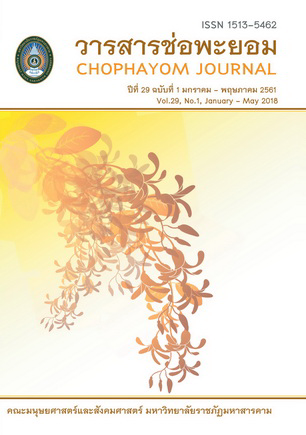รูปแบบการพัฒนาจริยธรรมด้านการมีวินัยของนักเรียน โรงเรียนมัธยมศึกษา ในจังหวัดพระนครศรีอยุธยา A Developing Model for Ethic Discipline of Secondary School Students in Pranakornsriayuthaya Province
บทคัดย่อ
บทคัดย่อ
การวิจัยนี้มีวัตถุประสงค์ 1) เพื่อศึกษาปัจจัยที่มีอิทธิพลต่อจริยธรรมด้านการมีวินัย ของนักเรียนโรงเรียนมัธยมศึกษา ในจังหวัดพระนครศรีอยุธยา 2) เพื่อสร้างรูปแบบการพัฒนาจริยธรรมด้านการมีวินัย ของนักเรียนโรงเรียนมัธยมศึกษา และ 3) เพื่อทดลองใช้และประเมินผลรูปแบบการพัฒนาจริยธรรมด้านการมีวินัย ของนักเรียนโรงเรียนมัธยมศึกษา วิธีดำเนินการวิจัยแบ่งเป็น 3 ระยะ คือ ระยะที่ 1 เป็นการศึกษาปัจจัยที่มีอิทธิพลต่อจริยธรรม ด้านการมีวินัย ของนักเรียนโรงเรียนมัธยมศึกษา ในจังหวัดพระนครศรีอยุธยา ประชากร คือ นักเรียนของโรงเรียนมัธยมศึกษา ในจังหวัดพระนครศรี อยุธยา ภาคเรียนที่ 2 ปีการศึกษา 2559 กำหนดกลุ่มตัวอย่าง ของ Taro Yamane จำนวน 394 คน ใช้วิธีการสุ่มแบบแบ่งชั้น (Stratified Random Sampling) เครื่องมือที่ใช้คือ แบบสอบถาม
วิเคราะห์ข้อมูลใช้สถิติการวิเคราะห์สมการเชิงโครงสร้าง (Structural Equation Model : SEM) โดยใช้โปรแกรมลิสเรล(LISREL for windows) เพื่ออธิบายอิทธิพลเส้นทาง (Path Analysis) กำหนด ค่านัยสำคัญทางสถิติที่ระดับ .05 ตัวแปรสาเหตุ จำนวน 6 ปัจจัยสาเหตุ ระยะที่ 2 เป็นการสร้างรูปแบบการพัฒนาจริยธรรมด้านการมีวินัยของนักเรียนโรงเรียนมัธยมศึกษา กลุ่มเป้าหมาย ได้แก่ นักวิชาการด้านการศึกษา จำนวน 5 คน ผู้อำนวยการโรงเรียน จำนวน 5 คน ครูฝ่ายกิจการนักเรียน จำนวน 5 คน ผู้ปกครองนักเรียน จำนวน 5 คน และนักเรียนดีเด่นของโรงเรียน จำนวน 5 คนรวมทั้งสิ้น จำนวน 25 คน ใช้การเลือกแบบเจาะจง โดยใช้ตัวแปรที่มีนัยสำคัญทางสถิติที่ระดับ .05 จากการวิจัยในระยะที่ 1 มาเป็นประเด็นในการพิจารณาสร้างรูปแบการพัฒนา เก็บรวบรวมข้อมูลโดยวิธีการประชุมกลุ่มย่อย และการระดมความคิดเห็นในที่ประชุมใหญ่ นำรูปแบบที่ปรับปรุงแก้ไขแล้ว ให้ผู้เชี่ยวชาญ จำนวน 3 ท่าน ประเมินความเหมาะสมของแนวทางการส่งเสริม และระยะที่ 3 เป็นการทดลองใช้และประเมินผลรูปแบบการพัฒนา
จริยธรรมด้านการมีวินัย ของนักเรียนโรงเรียนมัธยมศึกษา กลุ่มทดลอง คือ นักเรียนระดับชั้นมัธยมศึกษาปีที่ 5 โรงเรียนอยุธยาวิทยาลัย จำนวน 1 ห้องเรียน และ กลุ่มควบคุม ได้แก่ นักเรียนระดับชั้นมัธยมศึกษาปีที่ 5 โรงเรียนอยุธยาวิทยาลัย จำนวน 1 ห้องเรียน ที่ไม่ใช่ห้องเรียนของกลุ่มทดลอง รวมทั้งสิ้น จำนวน 84 คน ใช้การเลือกแบบสมัครใจ ประเมินผลการทดลอง โดยการเปรียบเทียบผลการทดลองหลังการทดลอง ระหว่างกลุ่มทดลองกับกลุ่มควบคุม ใช้การวิเคราะห์ความแปรปรวน (ร่วม) หลายตัวแปรตาม (Multivariate Analysis of Covariance : MANCOVA ) กำหนดค่านัยสำคัญทางสถิติที่ระดับ .05 ผลการวิจัยปรากฏ ดังนี้
1. ปัจจัยที่มีอิทธิพลต่อจริยธรรมด้านการมีวินัย ของนักเรียนโรงเรียนมัธยมศึกษา ในจังหวัดพระนครศรีอยุธยา อย่างมีระดับนัยสำคัญที่ระดับ .05 ประกอบด้วย 4 ตัวแปร 1) ด้านการเลียนแบบครูในการมีวินัย (0.14) 2) ด้านการเลียนแบบเพื่อนในการมีวินัย (0.11) 3) ด้านการเลียนแบบผู้ปกครองในการมีวินัย (0.10) และ 4) ด้านเจตคติการมีวินัย (0.08) 2. รูปแบบการพัฒนาจริยธรรมด้านการมีวินัย ของนักเรียนโรงเรียนมัธยมศึกษา ในจังหวัดพระนครศรีอยุธยา จาก 4 ตัวแปรสาเหตุ เป็นชุดกิจกรรมฝึก จำนวน 12 กิจกรรม ประกอบด้วย 1) กิจกรรมช่วยฟังหน่อย 2) กิจกรรม วินัยที่น่ารู้ 3) กิจกรรม วิเคราะห์และเลือกครูต้นแบบ 4) กิจกรรม ค้นหาบุคคลต้นแบบ 5) กิจกรรม การสร้างคุณค่าด้วยเวลา 6) กิจกรรม คุ้นเคย 7) กิจกรรม การรู้จักตนเอง 8) กิจกรรม บทบาทหน้าที่
9) กิจกรรม การแสดงบทบาทสมมติ 10) กิจกรรม แต่งกายดี 11) กิจกรรม วจีไพเราะ และ 12) กิจกรรม 5 ส 3. หลังการทดลองใช้รูปแบบการพัฒนาจริยธรรมด้านการมีวินัย ของนักเรียนโรงเรียนมัธยมศึกษาในจังหวัด พระนครศรีอยุธยา ในกลุ่มทดลอง มีการพัฒนาจริยธรรมด้านการมีวินัย ด้านการเลียนแบบครูในการมีวินัย ด้านการเลียนแบบเพื่อนในการมีวินัย ด้านการเลียนแบบผู้ปกครองในการมีวินัย และด้านเจตคติการมีวินัย เพิ่มขึ้นกว่ากลุ่มควบคุม อย่างมีนัยสำคัญทางสถิติที่ระดับ .05
ABSTRACT
This research aimed to (1) study factors affecting ethic discipline of secondary school students in Pranakornsriayuthaya Province, (2) formulate a development model of ethic discipline of secondary school students and (3) implement and evaluate the developed model of ethic discipline of secondary school students. The research procedure was divided into 3 stages. In the first stage, the researcher investigated factors which affected ethic discipline of secondary school students by formulating a model of ethic discipline of secondary school students as an outcome variable. Six causal factors were used for the study. Three hundred and ninety four of students of secondary school in Pranakornsriayuthaya Province by proportional stratified random sampling and using the questionnaire were used for analyzing of data. Structural Equation
Model: SEM, LISREL for Windows with Path Analysis at the .05 level of statistical significance. In the second stage, the researcher constructed the development model of ethic discipline of secondary school students by using the study result from the first stage. Twenty five involved persons were participated in the workshop to co-operatively criticized and evaluated the model of ethic discipline of secondary school students. In the third stage, the researcher implemented the model. The model and the control were evaluated by eighty four students in Ayutthaya Witthayalai Secondary School class 5 and analyzed by Multivariate Analysis of Covariance : MANCOVA at the .05 level of statistical significance. The major findings revealed the followings :
1. The developed causal factors showed harmony with the empirical data. Four causal factors with effects on ethic discipline of secondary school students in Pranakornsriayuthaya Province were including 1) Teacher imitation (0.14) 2) Friends imitation (0.11) 3) Parents imitation (0.10) และ 4) Attitudes (0.08) 2. The development model of effects on ethic discipline of secondary school students consisted of 4 causal factors 12 activities : 1) Listen me 2) Discipline 3) Teacher Idol 4) Idol 5) Time 6) Intimate 7) Myself 8) Role 9) Assume role 11) 5 S activities 10) smart 11) Melodious and 12) 5 S activities. 3. The students in the model showed higher ethic discipline than the control. Development as a whole and in 2 aspects: service and support than before implementation of model at the .05 level of statistical significance both MANCOVA at the .05 level of statistical significance.






